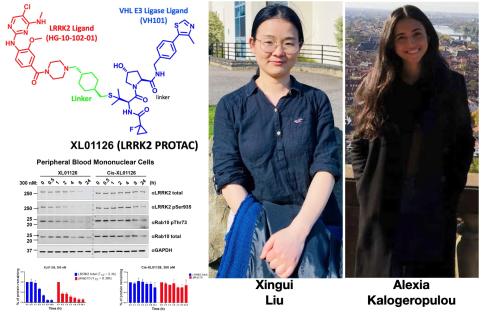
Researchers from the University of Dundee have discovered a small molecule that helps to eliminate a Parkinson’s disease-causing protein.
Parkinson’s disease is a progressive neurodegenerative disorder affecting more than 10 million people worldwide. No cure is available and current treatment is limited to symptomatic management.
Researchers from the University’s Centre for Targeted Protein Degradation (CeTPD) and MRC Protein Phosphorylation and Ubiquitylation Unit (MRC-PPU) have made significant strides towards developing new therapies through the design of XL01126, a small molecule that degrades a protein known to play a key role in the development of Parkinson’s.
The protein, Leucine Rich Repeat Kinase 2 (LRRK2), is one of the most important and promising targets for developing treatments for Parkinson’s disease, but until now scientists have only been able to inhibit its function rather than destroying it completely.
XL01126 eliminates LRRK2 from within the cell by utilising the cell’s natural waste disposal system. The research also demonstrated that XL01126 can be taken orally and can be detected in the brain in mice, two sought-after features of drugs targeting neurodegenerative diseases that can be very challenging to achieve.
The Dundee team, led by Dr Xingui Liu and Dr Alexia Kalogeropulou, believe XL01126 will be a very useful research tool compound and has the potential to lead to therapeutics for Parkinson’s disease.
“The discovery of XL01126 provides an exciting alternative strategy to target LRRK2 in addition to conventional LRRK2 kinase inhibitors. It can be a tool compound to decipher LRRK2 biology.” said Alexia.
“We are thrilled to see that XL01126 not only potently degrades LRRK2 in multiple cell lines, but also exhibits unexpected pharmacokinetic properties. Being orally bioavailable and blood-brain barrier permeable mean that further development of PROTAC degraders as therapeutics for Parkinson’s disease is possible.” said Xingui.
XL01126 offers a starting point for applying a degrader molecule in the treatment of LRRK2-driven Parkinson’s disease. It takes the field of targeted protein degradation (TPD) one step closer to develop drugs against neurodegenerative diseases.
The next steps in developing the treatment are currently underway with further pre-clinical studies to establish safety and effectiveness in vivo.
The University is one of the world leaders in TPD, a field of research that is revolutionising drug discovery and which has received billions of pounds of investment in recent years. This approach is making the treatment of diseases previously thought to be undruggable a reality.
Targeted protein degradation co-opts the cell’s natural disposal systems to remove disease-causing proteins and is applicable to diverse therapeutic areas including oncology, inflammation, dermatology, immunology and respiratory diseases.
Dundee researchers and teams led by CeTPD Director Professor Alessio Ciulli have previously revealed fundamental insights into the working of the degrader molecules that they have designed and that are used across the globe. Moreover, the seminal work conducted by the lab of MRC-PPU Director Professor Dario Alessi, which has identified various key components of the LRRK2 signalling pathway including the first physiological substrates of LRRK2, has been instrumental in qualifying the best LRRK2 PROTAC degraders.
Degrading rather than inhibiting a target protein offers several advantages such as a more efficacious drug response at lower doses, and a more targeted intervention with potentially reduced side effects and disease resistance. Proteolysis-targeting chimeras (PROTACs) are currently leading the field of TPD with multiple PROTAC degraders being trialled as candidate medicines against various diseases and progressing through clinical trials.
This research was supported by the European Research Council (ERC) under the European Union’s Seventh Framework Programme (FP7/2007-2013) as a Starting Grant to A.C. (grant agreement No. ERC-2012-StG-311460 DrugE3CRLs), the Innovative Medicines Initiative 2 (IMI2) Joint Undertaking under grant agreement no. 875510 (EUbOPEN project to A.C.), and Ono Pharmaceutical (Rising Star Fellowship to X.L.). A.F.K. was supported by a Parkinson’s U.K. Studentship (H-1701). D.R.A. lab is funded by the U.K. Medical Research Council [grant number MC_UU_00018/1].
To read a copy of the LRRK2 Protac manuscript click here https://pubs.acs.org/doi/full/10.1021/jacs.2c05499

